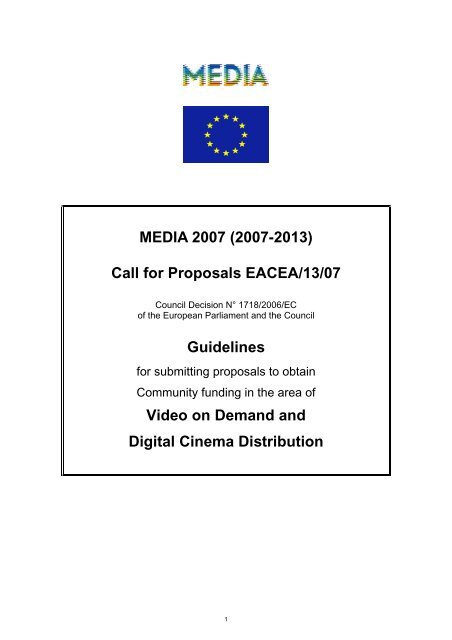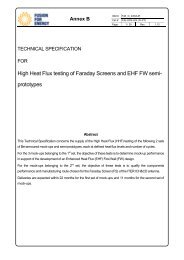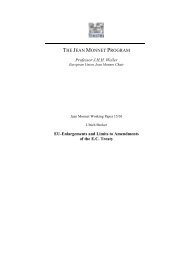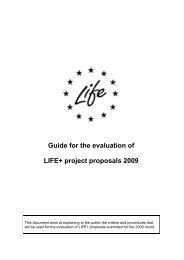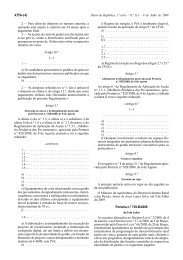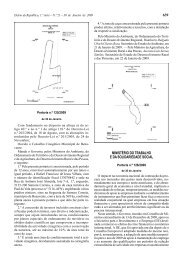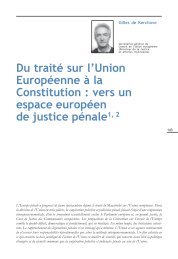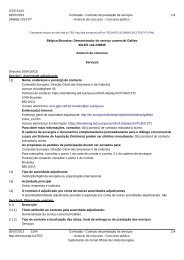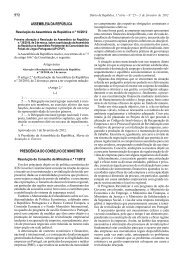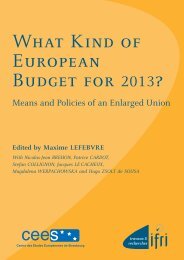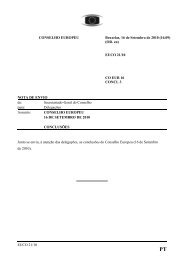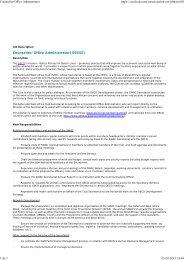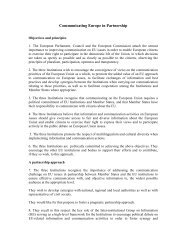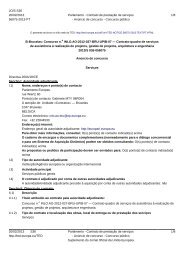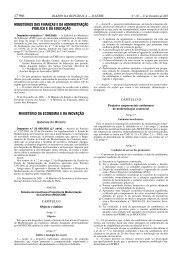MEDIA 2007 (2007-2013) Call for Proposals EACEA/13 ... - Infoeuropa
MEDIA 2007 (2007-2013) Call for Proposals EACEA/13 ... - Infoeuropa
MEDIA 2007 (2007-2013) Call for Proposals EACEA/13 ... - Infoeuropa
You also want an ePaper? Increase the reach of your titles
YUMPU automatically turns print PDFs into web optimized ePapers that Google loves.
<strong>MEDIA</strong> <strong>2007</strong> (<strong>2007</strong>-<strong>20<strong>13</strong></strong>)<br />
<strong>Call</strong> <strong>for</strong> <strong>Proposals</strong> <strong>EACEA</strong>/<strong>13</strong>/07<br />
Council Decision N° 1718/2006/EC<br />
of the European Parliament and the Council<br />
Guidelines<br />
<strong>for</strong> submitting proposals to obtain<br />
Community funding in the area of<br />
Video on Demand and<br />
Digital Cinema Distribution<br />
1
Guidelines – Video on Demand and Digital Cinema Distribution – <strong>Call</strong> <strong>for</strong> <strong>Proposals</strong> <strong>EACEA</strong>/<strong>13</strong>/07<br />
TABLE OF CONTENTS<br />
1. INTRODUCTION .................................................................................................................................................... 3<br />
1.1. LEGAL BASIS .................................................................................................................................................... 3<br />
2. OBJECTIVES ......................................................................................................................................................... 3<br />
2.1. OBJECTIVES OF THE PROGRAMME.................................................................................................................. 3<br />
2.2. OBJECTIVES OF THE VIDEO ON DEMAND AND DIGITAL CINEMA DISTRIBUTION SUPPORT SCHEME ............. 3<br />
2.3. PRIORITIES OF THIS CALL FOR PROPOSALS ................................................................................................... 4<br />
2.4. DEFINITIONS .................................................................................................................................................... 4<br />
3. CALENDAR ............................................................................................................................................................ 5<br />
4. AVAILABLE BUDGET.......................................................................................................................................... 6<br />
5. ELIGIBILITY CRITERIA........................................................................................................................................ 6<br />
5.1. ELIGIBLE ORGANISATIONS .............................................................................................................................. 6<br />
5.2. ELIGIBLE COUNTRIES ...................................................................................................................................... 6<br />
5.3. MINIMUM EUROPEAN DIMENSION AND ELIGIBLE CONTENT ........................................................................... 7<br />
5.3.1. Minimum European Dimension ......................................................................................................... 7<br />
5.3.2. Eligible Content.................................................................................................................................... 7<br />
5.4. ELIGIBLE ACTIVITIES........................................................................................................................................ 8<br />
5.4.1. Video on Demand (Business to Consumers-B2C)......................................................................... 8<br />
5.4.2. Digital Cinema Distribution (Business to Business-B2B) .............................................................. 8<br />
5.5. ELIGIBLE APPLICATIONS.................................................................................................................................. 8<br />
5.5.1. Language.............................................................................................................................................. 9<br />
5.5.2. Structure ............................................................................................................................................... 9<br />
6. EXCLUSION CRITERIA ....................................................................................................................................... 9<br />
7. SELECTION CRITERIA...................................................................................................................................... 10<br />
7.1. OPERATIONAL CAPACITY .............................................................................................................................. 10<br />
7.2. FINANCIAL CAPACITY..................................................................................................................................... 10<br />
7.3. AUDIT............................................................................................................................................................. 11<br />
8. AWARD CRITERIA ............................................................................................................................................. 11<br />
9. FINANCIAL CONDITIONS ................................................................................................................................. 12<br />
9.1. PAYMENT PROCEDURE ................................................................................................................................. <strong>13</strong><br />
9.2. AUDIT OF ACCOUNTS .................................................................................................................................... 14<br />
9.3. GUARANTEE................................................................................................................................................... 14<br />
9.4. DOUBLE FUNDING.......................................................................................................................................... 15<br />
9.5. ELIGIBLE COSTS............................................................................................................................................ 15<br />
9.5.1. Direct Eligible Costs.......................................................................................................................... 16<br />
9.5.2. Indirect Eligible Costs (Overheads) ................................................................................................ 18<br />
9.5.3. Reporting Costs................................................................................................................................. 18<br />
9.6. INELIGIBLE COSTS ......................................................................................................................................... 18<br />
9.7. SOURCES OF INCOME.................................................................................................................................... 19<br />
9.8. DURATION...................................................................................................................................................... 19<br />
9.8.1. Duration of the Project...................................................................................................................... 19<br />
9.8.2. Duration of the Contract ................................................................................................................... 19<br />
9.9. LEGAL ENTITY................................................................................................................................................ 20<br />
10. SUB-CONTRACTING AND CHOICE OF EXTERNAL SERVICES ........................................................ 20<br />
11. PUBLICITY....................................................................................................................................................... 21<br />
12. HOW TO APPLY ............................................................................................................................................. 21<br />
12.1. PUBLICATION ................................................................................................................................................. 21<br />
12.2. APPLICATION FORMS..................................................................................................................................... 21<br />
12.3. PRESENTATION OF THE APPLICATION........................................................................................................... 22<br />
12.4. APPLICABLE RULES....................................................................................................................................... 23<br />
12.5. CONTACTS..................................................................................................................................................... 23<br />
2
Guidelines – Video on Demand and Digital Cinema Distribution – <strong>Call</strong> <strong>for</strong> <strong>Proposals</strong> <strong>EACEA</strong>/<strong>13</strong>/07<br />
1. INTRODUCTION<br />
1.1. Legal basis<br />
This <strong>Call</strong> <strong>for</strong> <strong>Proposals</strong> is based on Decision 1718/2006/EC of the European Parliament and the<br />
Council of 15 November 2006 concerning the implementation of a programme of support <strong>for</strong> the<br />
European audiovisual sector (<strong>MEDIA</strong> <strong>2007</strong>) 1 .<br />
The European Commission is responsible <strong>for</strong> the implementation of the <strong>MEDIA</strong> Programme and <strong>for</strong><br />
the decision to grant individual European Community funds. The Education, Audiovisual and<br />
Culture Executive Agency administers the <strong>MEDIA</strong> Programme on behalf and under the control of<br />
the European Commission. The section responsible <strong>for</strong> the implementation of the call <strong>for</strong> proposals<br />
is the <strong>MEDIA</strong> programme unit, part of the Education, Audiovisual and Culture Executive Agency.<br />
The total budget <strong>for</strong> the <strong>MEDIA</strong> Programme <strong>2007</strong>-<strong>20<strong>13</strong></strong> is € 754.95 million.<br />
This call <strong>for</strong> proposals is aimed at European organisations whose activities contribute to the<br />
realisation of the objectives of the <strong>MEDIA</strong> Programme as described in the Council Decision<br />
1718/2006/EC. These guidelines explain how to submit a proposal in view of obtaining a<br />
community financial contribution.<br />
The community contribution will be limited to a maximum of 50% of the total eligible costs per<br />
project.<br />
2. OBJECTIVES<br />
2.1. Objectives of the Programme<br />
The global objectives of the programme are the following:<br />
a. preserve and enhance European cultural and linguistic diversity and its cinematographic and<br />
audiovisual heritage, guarantee its accessibility to the public and promote intercultural<br />
dialogue;<br />
b. increase the circulation and viewership of European audiovisual works inside and outside the<br />
European Union, including through greater cooperation between players;<br />
c. strengthen the competitiveness of the European audiovisual sector in the framework of an<br />
open and competitive European market favourable to employment, including by promoting<br />
links between audiovisual professionals.<br />
2.2. Objectives of the Video on Demand and Digital Cinema Distribution Support<br />
Scheme<br />
The Video on Demand and Digital Cinema Distribution scheme constitutes the way in which the<br />
<strong>MEDIA</strong> <strong>2007</strong> programme ensures that the latest technologies and trends are incorporated to the<br />
business practices of beneficiaries of the programme. Digital technologies have made European<br />
audiovisual works more easily accessible outside their country of origin thanks to new ways of<br />
transporting audiovisual content. The competitiveness of the audiovisual content industry in Europe<br />
will strongly depend on the use of these new technologies in the distribution stage.<br />
The main objective of this scheme is to support the creation and exploitation of catalogues of<br />
European works to be distributed digitally across borders to a wider audience and/or to cinema<br />
exhibitors through advanced distribution services, integrating where necessary digital security<br />
systems in order to protect online content. This <strong>Call</strong> <strong>for</strong> <strong>Proposals</strong> encourages the European<br />
audiovisual industry to adapt to new developments in digital technology.<br />
1<br />
Official Journal L327/12 of 24 November 2006<br />
3
Guidelines – Video on Demand and Digital Cinema Distribution – <strong>Call</strong> <strong>for</strong> <strong>Proposals</strong> <strong>EACEA</strong>/<strong>13</strong>/07<br />
The scheme is aimed at rights holders of European audiovisual works (i.e. independent European<br />
production and distribution companies), cinema networks and European operators making<br />
European content available.<br />
2.3. Priorities of this <strong>Call</strong> <strong>for</strong> <strong>Proposals</strong><br />
Rights holders are encouraged to <strong>for</strong>m consortia and plat<strong>for</strong>ms providing end-users with access to<br />
a significant number of European audiovisual works. Two types of services targeting two different<br />
types of audience are <strong>for</strong>eseen:<br />
• one aimed at the general audience through "video on demand" services (Business to<br />
Consumers),<br />
• one aimed at cinema exhibitors offering "digital cinema distribution" to their audience<br />
(Business to Business).<br />
<strong>Proposals</strong> may be based upon new or existing services and a limited period of time will be allowed<br />
in order to prepare the "public" launch of the project. The supported service should be launched at<br />
the latest by 1 st May 2008. (see 5.4 Eligible Activities & 9.5 Eligible Costs below).<br />
2.4. Definitions<br />
For the purposes of this call <strong>for</strong> proposals the following definitions shall apply:<br />
• Pre-financing payment(s): the pre-financing payment(s) received by the Beneficiary.<br />
• Beneficiary: Applicant who has signed a contract with the Executive Agency.<br />
• Co-ordinator: organisation entrusted by its partners to take full legal responsibility <strong>for</strong> the<br />
proper implementation of the project vis a vis the Executive Agency.<br />
• Co-beneficiary(ies): other partners mentioned in the application, which provide a contribution<br />
to the project. In case of selection of the project, the co-ordinator and each co-beneficiary will<br />
sign a mandate entrusting the co-ordinator to act in their name and account.<br />
• Budget Heading(s): the heading(s) of expenditure provided in the Forecast Budget. The<br />
headings of expenditure consist of “Personnel costs”, “Operating costs”, “Subcontracting costs”<br />
and “Overheads”.<br />
• Budget Sub-Heading(s): the heading(s) provided under each Budget Heading.<br />
• Digital Cinema Distribution: Digital delivery (to an acceptable commercial standard) of content<br />
to cinemas <strong>for</strong> theatrical exploitation (via hard disc, satellite, online…).<br />
• Eligible Costs: the costs directly linked to the execution of the Project receiving support, as<br />
detailed below in Article 9.5. and incurred during the period defined in the Agreement.<br />
• Eligible Content: feature films, TV films or series (fiction, animation documentary) or alternative<br />
content (making ofs, operas, concerts, per<strong>for</strong>mances, shorts). The following programmes will<br />
not be considered as eligible content: flow programming (news programmes, current affairs,<br />
DIY, talk shows, cooking lessons…), commercials, programmes promoting tourism.<br />
• European Content: content from a country participating in the <strong>MEDIA</strong> <strong>2007</strong> Programme.<br />
• Contributions in kind: the money equivalent of certain services or materials which could be<br />
contributed to the project by the partners (see section 9.6. on Ineligible Expenses).<br />
• Final Report: the report, which provides details of the Eligible Costs incurred in the execution of<br />
the Project and which shall <strong>for</strong>m the basis <strong>for</strong> the calculation of the Total Actual Costs of the<br />
Project.<br />
4
Guidelines – Video on Demand and Digital Cinema Distribution – <strong>Call</strong> <strong>for</strong> <strong>Proposals</strong> <strong>EACEA</strong>/<strong>13</strong>/07<br />
• Forecast Budget: the detailed budget <strong>for</strong> the Project.<br />
• Grant: the financial support awarded to the Beneficiary on the basis of the Total Actual Costs.<br />
• Interim Report(s): the interim reports have to be submitted according to the criteria defined in<br />
the Agreement. They provide details of the progress of the Project and of the Eligible Costs<br />
incurred at the time of their submission.<br />
• Note to the Forecast Budget: the note attached to the Forecast Budget detailing the costs<br />
incurred under the various Budget Headings and establishing the direct link with the execution<br />
of the Project.<br />
• The Programme: means the <strong>MEDIA</strong> <strong>2007</strong> Programme (<strong>2007</strong>-<strong>20<strong>13</strong></strong>).<br />
• Project: the activity receiving financial support and covering the preparation, implementation<br />
and evaluation stages.<br />
• Project Duration: The duration of the project may be 3 years or longer.<br />
• Video on Demand: Service enabling individuals to select audiovisual works from a central<br />
server <strong>for</strong> viewing on a remote screen by streaming and/or downloading.<br />
3. CALENDAR<br />
Applications must be sent to the Agency by 09/07/<strong>2007</strong> (the postmark will be taken as proof of<br />
timely sending). Please read carefully section 12 of this <strong>Call</strong> <strong>for</strong> <strong>Proposals</strong> concerning the<br />
procedure <strong>for</strong> submitting applications.<br />
The period of eligibility of the selected projects may start on 09/07/<strong>2007</strong> (at the earliest) and will<br />
end on 31/12/2008. The possible eligibility period <strong>for</strong> the first "year" of the project extends over 18<br />
months, since it includes preparation and launching of the service. (see 5.4. & 9.5 below)<br />
Applicants will be in<strong>for</strong>med within two weeks following the Commission's decision. For selected<br />
projects, an agreement will be signed between the beneficiary and the Agency.<br />
Should an application be unsuccessful, the Agency will in<strong>for</strong>m the applicant as soon as possible<br />
and in writing of the reasons <strong>for</strong> the decision with regard to the criteria established in this call <strong>for</strong><br />
proposals.<br />
The payment schedule is set out in section 9.1 below.<br />
The final reports need to be presented as soon as possible after completion of the project and no<br />
later than 3 months after the end date of the project.<br />
The procedure <strong>for</strong> considering applications will be as follows:<br />
− receipt, registration and acknowledgement by the Executive Agency – July;<br />
− consideration and pre-evaluation by the Executive Agency – July/August;<br />
− evaluation and proposal selection – September;<br />
− preparation of the Commission proposal – September;<br />
− consideration and final decision by the <strong>MEDIA</strong> Committee / European Parliament –<br />
October/November;<br />
− notification of the results and closure of the award procedure – November;<br />
− contractualisation – November.<br />
5
4. AVAILABLE BUDGET<br />
Guidelines – Video on Demand and Digital Cinema Distribution – <strong>Call</strong> <strong>for</strong> <strong>Proposals</strong> <strong>EACEA</strong>/<strong>13</strong>/07<br />
The maximum amount available under this <strong>Call</strong> <strong>for</strong> <strong>Proposals</strong> is 4 million Euro. Community<br />
contributions per project will under no circumstances exceed 50% of the total eligible costs.<br />
The amount of the financial contribution to be awarded will be determined within the limits of<br />
available budgetary resources and in consideration of the costs and nature of each project,<br />
assessed on the basis of the application and the selection and award criteria, and shall take the<br />
<strong>for</strong>m of a Grant.<br />
The Commission reserves the right not to allocate this entire budget.<br />
In no circumstances does the award of a contribution in previous years infer the right to a grant<br />
under the present call <strong>for</strong> proposals.<br />
5. ELIGIBILITY CRITERIA<br />
As a first step in the assessment and selection process, the Executive Agency will check the<br />
applicants’ compliance with the eligibility criteria. Failure to comply will result in exclusion of the<br />
application from the selection process.<br />
5.1. Eligible Organisations<br />
This <strong>Call</strong> <strong>for</strong> <strong>Proposals</strong> is aimed at European organisations registered in an eligible country (see<br />
5.2. below), who have as their main activity audiovisual production, distribution, exhibition and<br />
aggregation. These organisations must be owned directly or by majority participation, by nationals<br />
from eligible countries, and continues to be owned, whether directly or by majority participation, by<br />
nationals from these countries.<br />
It should be noted that “natural” persons (i.e. individuals) cannot submit applications.<br />
Any applicant or group of applicants must not have majority control (either in shareholding or<br />
commercial terms) by a broadcaster and/or a telecommunications company. Majority control is<br />
considered to occur when more than 25% of the company's share capital is held by a single<br />
broadcaster or telecommunications company (50% when several broadcasters or<br />
telecommunications companies are involved) or when, over a three-year period, more than 90% of<br />
the company’s revenue is generated in co-operation with a single broadcaster or<br />
telecommunications company.<br />
The Commission reserves the right to apply this criterion by taking into account the specific<br />
characteristics of the different audiovisual and/or legal systems of the Member States and other<br />
participating countries. The Agency will check groups' compliance with the criteria on the basis of<br />
the in<strong>for</strong>mation provided in the application and the following supporting documents:<br />
Any potential beneficiary (i.e. a single applicant or the co-ordinator of a group or consortium)<br />
MUST provide up to date copies of their statutes and certificate of company registration and VAT<br />
registration (including copies of all amendments) and a short explanation of the ownership of<br />
the company.<br />
The Agency reserves the right to request these documents from other members of the project.<br />
5.2. Eligible Countries<br />
This call <strong>for</strong> proposals is open to applicants from the Member States of the European Union, the<br />
EEA members (Norway, Iceland and Liechtenstein) and from Switzerland, subject to the<br />
conclusion of a new cooperation agreement with this country in the framework of the <strong>MEDIA</strong> <strong>2007</strong><br />
Programme.<br />
6
Guidelines – Video on Demand and Digital Cinema Distribution – <strong>Call</strong> <strong>for</strong> <strong>Proposals</strong> <strong>EACEA</strong>/<strong>13</strong>/07<br />
5.3. Minimum European Dimension and Eligible Content<br />
5.3.1. Minimum European Dimension<br />
Proposed projects will have to offer a European dimension, which means that the offered content<br />
must include audiovisual works from at least four eligible countries representing at least three<br />
different official languages of the European Union.<br />
No more than 40% of the content (in programme hours) may come from a single territory.<br />
5.3.2. Eligible Content<br />
Eligible Content means feature films, TV films or series (fiction, animation documentary) or<br />
alternative content (making ofs, operas, concerts, per<strong>for</strong>mances, shorts). The following<br />
programmes will not be considered as eligible content: flow programming (news programmes,<br />
current affairs, DIY, talk shows, cooking lessons…), commercials, programmes promoting tourism.<br />
European Content means content from a country participating in the <strong>MEDIA</strong> <strong>2007</strong> Programme. No<br />
restrictions concerning the year of copyright apply.<br />
The qualification of films by the <strong>MEDIA</strong> Programme applies, which means that:<br />
o the work must be majority produced by companies established in one or more eligible<br />
countries<br />
and<br />
o the work must be produced with the significant participation of professionals who are<br />
nationals/residents of eligible countries. ‘Significant participation’ is defined as having 10 or<br />
more points on the basis of the table below, (or the biggest share of points if the total is less<br />
than 19 in the case of documentaries or animation films):<br />
+ Points<br />
Director 3<br />
Scriptwriter 3<br />
Composer 1<br />
Actor 1 2<br />
Actor 2 2<br />
Actor 3 2<br />
Artistic Director / Production Designer 1<br />
Director of Photography 1<br />
Editor 1<br />
Sound 1<br />
Shooting location 1<br />
Laboratory 1<br />
TOTAL 19<br />
Audiovisual works consisting of advertising, pornographic, racist material or advocating violence<br />
are not eligible <strong>for</strong> support.<br />
Please refer to the database of the <strong>MEDIA</strong> Programme, in order to check if the films of the<br />
submitted catalogue are European.<br />
The database of all films which have been processed is available <strong>for</strong> consultation at:<br />
http://eacea.ec.europa.eu/media/films/<br />
The Agency reserves the right to check if a film of the submitted catalogue is European or not.<br />
7
Guidelines – Video on Demand and Digital Cinema Distribution – <strong>Call</strong> <strong>for</strong> <strong>Proposals</strong> <strong>EACEA</strong>/<strong>13</strong>/07<br />
5.4. Eligible Activities<br />
2 types of services are eligible: "Video on Demand" and "Digital Cinema Distribution".<br />
The purpose of grouping independent rights holders which have as their main activity audiovisual<br />
production, distribution, exhibition and aggregation is to make available catalogue(s) of a size<br />
capable of sustaining a digital distribution activity.<br />
The content to be provided by the proposed service should be sufficient to achieve the audience<br />
and commercial targets set out in the proposal and business plan. The digital standards should be<br />
compatible with the commercial sector.<br />
Projects should assure the best possible accessibility to European content by the appropriate use<br />
of open standards furthering interoperability.<br />
Candidates should note that selection <strong>for</strong> Community funding is a competitive process and that<br />
simply setting lower targets based upon a lack of content will result in lower marking of the project<br />
at the award stage probably leading to exclusion.<br />
Period of Eligibility (see also 9.5 Eligible Costs below)<br />
The launching of digital distribution services is a critical moment and it is important that any project<br />
has been properly prepared and the necessary ground work carried out be<strong>for</strong>e the service is<br />
launched. There<strong>for</strong>e in the case of this call <strong>for</strong> proposals the eligibility period is extended and may<br />
include (if demanded by the project) a preparatory phase designed to prepare the service <strong>for</strong><br />
launching:-<br />
The project may thus (if required) be divided up into two distinct phases:<br />
- A preparatory phase of the service to be offered lasting up to 6 months (the preparatory phase<br />
may be longer than 6 months but the period of eligibility of costs can only start 6 months be<strong>for</strong>e the<br />
launch of the service).<br />
- The launch and implementation phase of the service to be offered up to the end of the potential<br />
eligibility period, the 31 st December 2008. (see also the Final Report specifications at 9.5.3 below)<br />
In any case the service must be launched by the 1 st May 2008 at the latest.<br />
5.4.1. Video on Demand (Business to Consumers-B2C)<br />
Video on Demand (VoD): Service enabling individuals to select audiovisual works from a central<br />
server <strong>for</strong> viewing on a remote screen by streaming and/or downloading.<br />
5.4.2. Digital Cinema Distribution (Business to Business-B2B)<br />
Digital Cinema Distribution (DCD): Digital delivery (to an acceptable commercial standard) of<br />
content to cinemas <strong>for</strong> theatrical exploitation (via hard disc, satellite, online…).<br />
5.5. Eligible Applications<br />
To be eligible, the applications should:<br />
• be sent to the Agency by the relevant deadline (postmark will be taken as proof of timely<br />
sending.)<br />
• respect these guidelines and be correctly and fully completed,<br />
• be submitted using the official application <strong>for</strong>ms (Part A & B + Annexes I to V)<br />
• include a signed, detailed, balanced and correctly calculated budget complying with all the<br />
conditions set out under section 9 and 12 of this call <strong>for</strong> proposals.<br />
• include all the official <strong>for</strong>ms, duly completed and signed<br />
• include all documents requested in the Checklist (Annex I)<br />
8
Guidelines – Video on Demand and Digital Cinema Distribution – <strong>Call</strong> <strong>for</strong> <strong>Proposals</strong> <strong>EACEA</strong>/<strong>13</strong>/07<br />
The assessment is made on the basis of the documents sent by the relevant deadline. Incomplete<br />
applications may be rejected <strong>for</strong> ineligibility reasons.<br />
The Commission reserves the right to request additional in<strong>for</strong>mation from the applicant.<br />
5.5.1. Language<br />
All sections should be completed preferably in English. The three-year business plan required in<br />
the application must in any case be in English.<br />
5.5.2. Structure<br />
The application <strong>for</strong>ms include the following two parts:<br />
• Part A collects administrative in<strong>for</strong>mation about the proposal and its proposers (e.g. title of the<br />
proposed project, proposer’s names and addresses, brief description of the work, total funding<br />
requested by type of expenditure, etc…).<br />
• Part B asks <strong>for</strong> a detailed description of the nature of the proposed project. Part B should also<br />
identify and describe the partners and their responsibilities within the proposed project.<br />
6. EXCLUSION CRITERIA<br />
Applicants must certify that they are not in any of the situations described in Articles 93 & 94 of the<br />
Financial Regulations applicable to the budgets of the European Communities (EC Council<br />
Regulation, Euratom-n° 1605/2002 25 June 2002.) These situations are set out below.<br />
Applicants are excluded from participation in this call <strong>for</strong> proposals <strong>for</strong> the following reasons:<br />
a. they are bankrupt or being wound up, are having their affairs administered by the courts, have<br />
entered into an arrangement with creditors have suspended business activities, are the<br />
subject of proceedings concerning these matters, or are in any analogous situation arising<br />
from a similar procedure provided <strong>for</strong> in national legislation or regulations;<br />
b. they have been convicted of an offence concerning professional conduct by a judgment which<br />
has the <strong>for</strong>ce of res judicata;<br />
c. they have been guilty of a serious offence proven by any means which a contracting authority<br />
can justify;<br />
d. they have not fulfilled obligations relating to the payment of social security contributions or the<br />
payment of taxes in accordance with the legal provisions of the country where they are<br />
established or with those of the country of the contracting authority or of the country where the<br />
project is to be implemented;<br />
e. they have been the subject of a judgment which has the <strong>for</strong>ce of res judicata <strong>for</strong> fraud,<br />
corruption, involvement in a criminal organisation or any other illegal activity detrimental to the<br />
Communities' financial interests;<br />
f. following another grant award procedure or procurement procedure financed by the<br />
Community budget, they have been declared to be in serious breach of contract <strong>for</strong> failure to<br />
comply with contractual obligations.<br />
Applicants cannot receive a contribution if they are in one of the following situations while the<br />
grants procedure is in progress:<br />
a. they are subject to a conflict of interest;<br />
9
Guidelines – Video on Demand and Digital Cinema Distribution – <strong>Call</strong> <strong>for</strong> <strong>Proposals</strong> <strong>EACEA</strong>/<strong>13</strong>/07<br />
b. they are guilty of misrepresentation in supplying the in<strong>for</strong>mation required by the<br />
Commission as a condition of participation in the relevant call <strong>for</strong> proposals or fail to supply<br />
this in<strong>for</strong>mation.<br />
Administrative and financial penalties may be imposed by the Commission on applicants found<br />
guilty of false declarations or who admit to a serious breach of their contractual obligations under a<br />
previous contract or call <strong>for</strong> tender, in accordance with the provisions of Articles 93 to 96 of the<br />
Financial Regulation.<br />
In order to respect these criteria, the applicant must sign a declaration of honour stating not to be<br />
in any of the situations set out in Articles 93 & 94. This declaration is included in the Application<br />
Forms provided in Annex IV.<br />
7. SELECTION CRITERIA<br />
The selection criteria are aimed at assessing the applicant’s operational and financial capacity to<br />
complete the proposed action or work programme.<br />
7.1. Operational Capacity<br />
Applicants must prove their operational capacity to implement the action by demonstrating that<br />
they have the human and technological resources that are required to implement the project.<br />
To enable assessment of the operational capacity, applicants must provide the following<br />
documents as part of their application:<br />
• a detailed presentation and the track record of the applying organisation (if the organisation<br />
has been set up <strong>for</strong> the purpose of the submitted project, the track record(s) of the<br />
organisation(s) and/or person(s), which founded the applying organisation, are requested),<br />
• the CV of the legal representative of the applying organisation;<br />
• the CVs of the person(s) in charge of the project and of the key staff involved in its<br />
implementation<br />
• the description of the technological resources<br />
• evidence that the applying organisation has the capacity to provide the intended content and how<br />
7.2. Financial Capacity<br />
Applicants must have stable and sufficient sources of funding to maintain their activity<br />
throughout the period during which the action is being carried out.<br />
In signing the Declaration in Annex IV, the applicant declares on the honour to have financial and<br />
operational capacity to implement the project <strong>for</strong> which support is requested.<br />
The proposal submitted must include the following:<br />
• The balance sheet <strong>for</strong> the last fiscal year;<br />
• A profit & loss account <strong>for</strong> the last fiscal year;<br />
• The <strong>for</strong>m concerning the applicant’s financial capacity (Annex III), duly and carefully completed.<br />
The in<strong>for</strong>mation provided (figures) will be based on those from the most recent complete closed<br />
certified accounts, provided with the application. The applicant certifies that these figures are<br />
accurate and verifiable. This in<strong>for</strong>mation will be necessary to the evaluation of applicant’s<br />
financial solidity and co-financing capacity.<br />
10
Guidelines – Video on Demand and Digital Cinema Distribution – <strong>Call</strong> <strong>for</strong> <strong>Proposals</strong> <strong>EACEA</strong>/<strong>13</strong>/07<br />
7.3. Audit<br />
In the event that the contribution sought from the <strong>MEDIA</strong> <strong>2007</strong> Programme is higher than<br />
€ 500,000, an audit report produced by an approved external auditor shall be submitted. That<br />
report shall certify the accounts <strong>for</strong> the last financial year available. The Agency may waive this<br />
obligation <strong>for</strong> public bodies and institutions.<br />
8. AWARD CRITERIA<br />
Eligibility and Selection Criteria will be assessed by the Executive Agency.<br />
Award Criteria will be evaluated by means of an Evaluation Committee advised by external<br />
independent experts.<br />
Candidates with eligible projects should pay particular attention to the Award Criteria below and be<br />
aware of the fact that the assessment of their project in relation to each of these criteria will determine<br />
their potential <strong>for</strong> future award of a contract.<br />
Each member of the group has to demonstrate the way in which its service, and more particularly<br />
the catalogue provided, will improve and be made more attractive over the years.<br />
The following example of an "ideal quality catalogue" is intended to give candidates a flavour of the<br />
type of content the Commission would wish to see included in a given VOD service.<br />
Quality catalogues should normally contain a minimum of 50% European feature films (and a<br />
minimum of 35% of feature films from European countries with a low production capacity), and 70% of<br />
European films or programmes.<br />
The following chart summarizes an example of an ideal quality catalogue. The various categories<br />
are not inclusive i.e. works from countries with a low production capacity should ideally comprise<br />
35% of the total and not 35% of the total should be European feature films from a countries with a<br />
low production capacity.<br />
From Countries<br />
with a Low<br />
Production<br />
Capacity (35%)<br />
Feature Films (50%)<br />
European (70%)<br />
All<br />
11
Guidelines – Video on Demand and Digital Cinema Distribution – <strong>Call</strong> <strong>for</strong> <strong>Proposals</strong> <strong>EACEA</strong>/<strong>13</strong>/07<br />
Non European films or programmes may be included in the catalogue, however the costs, specifically<br />
related to these non European works, will not be eligible (see section 9.6 on Ineligible Costs).<br />
It is intended to propose approximately 6 projects.<br />
Applications will be ranked according to the award criteria defined and weighted below. Within the limit<br />
of the available budget, projects obtaining the highest scores will be selected.<br />
European dimension of the catalogue<br />
Will be taken into account: cross-border distribution, cross-language distribution and<br />
distribution of content from countries with a low production capacity.<br />
30%<br />
o<br />
o<br />
o<br />
Cross-border distribution<br />
Cross-language distribution<br />
Distribution of content from countries with a low production capacity<br />
10%<br />
10%<br />
10%<br />
Quality and cost-effectiveness of the project submitted<br />
Will be taken into account: the overall way and consistency in which the project and its<br />
financial plan is presented.<br />
o Quality of the Work Plan<br />
o Quality of the Financial Plan (in terms of cost-effective delivery of the goals of the<br />
projects)<br />
Human and technological capabilities of the project<br />
Will be taken into account: the experience of participating human and technical resources<br />
of the organisations participating in the project<br />
25%<br />
10%<br />
15%<br />
20%<br />
o<br />
o<br />
Human Resources<br />
Technological Resources<br />
10%<br />
10%<br />
Target audience and Potential impact<br />
Will be taken into account: the number of countries targeted and the solutions to be<br />
implemented by the project in order to provide professional services to its target audience,<br />
the planned actions in order to raise awareness among the target audience of the<br />
project.<br />
o Size of the potential audience<br />
o Number of territories with an effective marketing strategy<br />
o Quality of the marketing plan (as a whole)<br />
Innovative aspects of the action<br />
Will be taken into account: the new ideas and solutions presented in the project plan.<br />
20%<br />
5%<br />
5%<br />
10%<br />
5%<br />
9. FINANCIAL CONDITIONS<br />
The selection of a particular applicant, does not signify agreement to the level of financial support<br />
requested.<br />
The amount of the financial contribution awarded is determined in consideration of the costs and<br />
nature of projects.<br />
The award of a contribution does not infer any right to a grant in subsequent years.<br />
Under no circumstances may the amount awarded exceed the amount requested.<br />
12
Guidelines – Video on Demand and Digital Cinema Distribution – <strong>Call</strong> <strong>for</strong> <strong>Proposals</strong> <strong>EACEA</strong>/<strong>13</strong>/07<br />
Applicants from States which are members of the Euro Zone must present their budget and reports<br />
exclusively in Euro. All other applicants must present their budget in both Euro and their<br />
national currency. Currency conversions in the Budget Form should be calculated using the<br />
official exchange rate applicable at the beginning of the previous month of the relevant<br />
deadline <strong>for</strong> submission of the proposals under the present <strong>Call</strong> <strong>for</strong> <strong>Proposals</strong>. These<br />
exchange rates can be obtained from the national <strong>MEDIA</strong> Desks and Antennae and from the<br />
European Commission website:<br />
http://ec.europa.eu/budget/in<strong>for</strong>euro/<br />
The exact rate used should be specified within the space provided on the Budget Form.<br />
Applicants should note that currency conversions must be made on an item by item basis and the<br />
sub-totals and totals of each budget sub-category calculated from the converted euro amounts <strong>for</strong><br />
each item (and not simply converted from the equivalent subtotal in a national currency), so that<br />
both national currency and euro budgets are coherent and totally correct.<br />
Applicants are strongly advised to re-check all automatic calculations with a simple calculator.<br />
The budget must be balanced and clearly indicate the costs <strong>for</strong> which a Community co-financing is<br />
requested.<br />
Applicant must specify in the budget all sources and values of contributions anticipated / sought <strong>for</strong><br />
the project.<br />
Under no circumstances may the community contribution give rise to a profit <strong>for</strong> the beneficiary.<br />
Profit is defined as having achieved greater revenues than costs. Any profit will result in a<br />
proportionate reduction to the contribution finally paid.<br />
The bank account specified in the Application <strong>for</strong>ms must enable any Community contribution to be<br />
identified. This account shall be opened specifically <strong>for</strong> EU funds received <strong>for</strong> carrying out the<br />
action <strong>for</strong> which the grant is awarded. If the contribution paid into this account generates any<br />
interest or equivalent profit (under the relevant national law of the country in which the account is<br />
based), the beneficiary must, upon submission of the Final report, declare this interest resulting<br />
from any pre-financing. The interest or equivalent profit will be recovered when the balance of the<br />
contribution is paid.<br />
The beneficiary is committed to carrying out the project as presented in the application<br />
<strong>for</strong>m.<br />
9.1. Payment Procedure<br />
The financial support granted in the framework of this <strong>Call</strong> <strong>for</strong> <strong>Proposals</strong> will take the <strong>for</strong>m of a<br />
Grant as specified in Article 9 of Council Decision 1718/2006/EC.<br />
Should an application be approved by the Commission, an agreement (in Euro) specifying the<br />
conditions of the grant and the level of community financing will be concluded between the<br />
Executive Agency and the beneficiary. Original copies of this agreement must be signed and<br />
returned to the Executive Agency who will be the last party to sign.<br />
The payment of the Community’s contribution will be normally made as follows, in two instalments:<br />
- A pre-financing payment of 80% of the total financial support after the signature by the two parties<br />
of the contract between the Executive Agency and the beneficiary and within 45 days of reception<br />
and acceptance of a bank guarantee. Pre-financing is considered as a down payment providing<br />
cash flow to the beneficiary;<br />
(The project may opt not to have a pre-financing payment. In this case the first payment,<br />
corresponding to a maximum 50% of the value of the contract, will take place after reception and<br />
acceptance of a detailed cost statement, signed by the contractor and verified by an approved<br />
external auditor and a mid-term activity report covering the first 9 months of the activity.)<br />
<strong>13</strong>
Guidelines – Video on Demand and Digital Cinema Distribution – <strong>Call</strong> <strong>for</strong> <strong>Proposals</strong> <strong>EACEA</strong>/<strong>13</strong>/07<br />
- The remaining part of the financial support following the presentation and acceptance by the<br />
Executive Agency of the Comprehensive Final Activity Report and a Final Financial Statement<br />
giving detailed breakdowns of the final costs and revenues of the project and duly certified by an<br />
approved external auditor, as well as all proper accounting documents <strong>for</strong> the expenses made.<br />
The amount of this contribution depends on real costs incurred by the beneficiary and the levels of<br />
co-financing ultimately obtained. Should actual expenses incurred by the beneficiary <strong>for</strong> the<br />
implementation of the project be lower than the costs <strong>for</strong>eseen in the provisional application<br />
budget, the Executive Agency will apply the financing rate set out in the contract. If appropriate, the<br />
beneficiary will be required to reimburse any surplus already paid as pre-financing payment.<br />
9.2. Audit of Accounts<br />
Should the project be selected, an agreement shall be signed between the Executive Agency and<br />
the beneficiary, by which the beneficiary shall undertake to allow Commission/Executive Agency<br />
staff, staff from the Court of Auditors of the European Communities and persons authorised by<br />
them, appropriate access to the sites or premises where the project is being carried out and to all<br />
documents relating to the technical and financial management of the operation. Access by persons<br />
authorised by the Commission/Executive Agency may be subject to confidentiality arrangements to<br />
be agreed between the Commission/Executive Agency and the beneficiary.<br />
The beneficiary shall also agree to the Commission/Executive Agency and the Court of Auditors of<br />
the European Communities verifying the use to which the financial contribution is put in<br />
accordance with the Council Regulation 1605/2002 of 25 June 2002 and the Commission<br />
Regulation 2342/2002 of 23 December 2002 applicable to the general budget of the Commission,<br />
as amended, throughout the duration of the agreement and <strong>for</strong> five years after the final payment of<br />
the Community contribution.<br />
The beneficiary shall also undertake to ensure that any co-beneficiaries accept these same<br />
obligations.<br />
Checks by the Commission/Executive Agency or the Court of Auditors of the European<br />
Communities may be carried out on the basis of documents or on the spot.<br />
9.3. Guarantee<br />
The Executive Agency shall request a bank guarantee (in a <strong>for</strong>mat specified by the Agency) <strong>for</strong> an<br />
amount equal to the pre-financing payment, which corresponds to 80% of the value of the contract.<br />
The costs <strong>for</strong> the bank guarantee are eligible expenses and can be included in the Forecast<br />
Budget.<br />
The guarantee aims to make the guarantor liable <strong>for</strong> all obligations of the beneficiary of a<br />
community contribution.<br />
This financial guarantee, which must be made in Euro, is to be provided by a recognised financial<br />
or banking institution established in any of the European Union’s Member States.<br />
Subject to prior agreement by the Executive Agency, this guarantee can be replaced by the<br />
personal liability of a third party or the beneficiary involved in the agreement concerning the<br />
project.<br />
The financial guarantee will be returned within 60 days upon final payment of the subsidy,<br />
con<strong>for</strong>ming to the conditions set out in the agreement.<br />
14
9.4. Double Funding<br />
Guidelines – Video on Demand and Digital Cinema Distribution – <strong>Call</strong> <strong>for</strong> <strong>Proposals</strong> <strong>EACEA</strong>/<strong>13</strong>/07<br />
One project may give rise to the award of only one grant from the Community budget to one<br />
beneficiary. The project proposed by the applicant cannot receive double funding.<br />
Applicants must indicate in the application <strong>for</strong> support what other applications <strong>for</strong> financial support<br />
they have submitted or will be submitting to the European Institutions during the same year,<br />
indicating <strong>for</strong> each support the Community Programme concerned and the amount of the support.<br />
9.5. Eligible Costs<br />
The expenditure part of the Forecast Budget must be sufficiently detailed to allow ‘eligible costs’ to<br />
be distinguished from any ‘ineligible costs’.<br />
The period of eligibility of costs may start on 09/07/<strong>2007</strong> (at the earliest) and end on 31/12/2008<br />
(see also 5.4. above).<br />
Costs incurred prior to the beginning of the period of eligibility of costs will not be<br />
accepted.<br />
Only Cash costs identified in the Budget Form attached to the present <strong>Call</strong> <strong>for</strong> <strong>Proposals</strong> will be<br />
considered eligible costs.<br />
Eligible expenses may only be charged to the project over the duration of the period of preparation,<br />
implementation and follow-up of the project / event, i.e. during the defined period of eligibility of<br />
costs (see 5.4. above).<br />
The Forecast Budget shall be in two parts. Firstly a summary budget <strong>for</strong> the three year period<br />
covered in the business plan and secondly a detailed budget <strong>for</strong> the proposed project <strong>for</strong> the<br />
eligible period ending on the 31 st December 2008 (see also the specifications <strong>for</strong> the Final Report<br />
at 9.5.3. below). The Commission/Agency reserves the right to request changes in the work plan<br />
and detailed budget following the results of the selection process.<br />
The personnel costs, travel and subsistence costs, as well as any amount higher than € 10 000<br />
must be broken down into detail giving unit prices and number of units where appropriate and<br />
sufficiently detailed to allow identification, monitoring and control of the proposed activity.<br />
No amount higher than € 10 000 will be considered as eligible in the absence of a detailed<br />
breakdown and an appropriate justification.<br />
Costs which are considered as eligible are those which are:<br />
• necessary <strong>for</strong> the implementation of the event/project and directly linked to it, written in the<br />
provisional budget attached in the agreement, reasonable and in con<strong>for</strong>mity with the principles<br />
of sound financial management and cost-effective;<br />
• generated during the eligible period of costs as defined in the agreement;<br />
• actually incurred by the applicant (co-ordinator or co-beneficiaries), registered in the<br />
beneficiary’s accounts in accordance with the relevant accountancy principles, and have been<br />
declared according to national financial and social security regulations;<br />
• identifiable and verifiable on the basis of justifying documents.<br />
Personnel costs cannot exceed 40% of the total eligible costs of the project.<br />
No costs may be assigned to different category of costs in the final accounts if it has previously<br />
been assigned to a different category in the budget.<br />
15
Guidelines – Video on Demand and Digital Cinema Distribution – <strong>Call</strong> <strong>for</strong> <strong>Proposals</strong> <strong>EACEA</strong>/<strong>13</strong>/07<br />
A beneficiary of a community support is obliged to maintain a clear analytical accounting system<br />
<strong>for</strong> the costs of the supported project. This accounting and classification system will facilitate the<br />
verification and certification of the final costs by the approved external auditor necessary <strong>for</strong> the<br />
payment of the financial contribution. The independent audit of all final accounts is mandatory.<br />
The beneficiary’s accounting procedures must allow the reconciliation of costs and revenues<br />
declared in relation to the project supported with the corresponding justifying evidence and the<br />
organisation’s accounts.<br />
9.5.1. Direct Eligible Costs<br />
Direct eligible costs are those which respect the general conditions of eligibility set out in the<br />
previous paragraph, are necessary <strong>for</strong> and specific to the implementation of the action/project and<br />
can be directly attributed to it.<br />
The following direct costs are considered eligible, as long as they meet the following criteria:<br />
• Costs relating to the purchase of equipment (new or second hand) are eligible as long as they<br />
are depreciated using the relevant and commonly accepted accountancy principles. Only the<br />
amortised cost relating to the duration of the project/action is eligible.<br />
• All the following described directs costs are eligible:<br />
9.5.1.1. Personnel Costs<br />
Personnel Costs must be calculated on the basis of the actual daily salary/fee of the<br />
employee/service provider, multiplied by the number of days worked on the project. This figure<br />
must include all the usual contributions paid by the employer, such as social security contributions.<br />
The Personnel costs shall be substantiated by detailed timesheets of the work done.<br />
The daily salary shall be based on the average salary charged at national level <strong>for</strong> qualified<br />
personnel executing comparable tasks.<br />
The maximum number of days per year per person is 220.<br />
Senior employees and directors shall be identified by name in the Forecast Budget. Their salaries<br />
may not be distributed over several Budget Headings.<br />
Personnel costs cannot exceed 40% of the total eligible costs of the project.<br />
9.5.1.2. Operating Costs<br />
Under this budget heading the following sub-headings can be included:<br />
• Travel and subsistence costs<br />
May be claimed only <strong>for</strong> journeys directly linked to the project and relating to specific and clearly<br />
identifiable activities; it is requested to justify in the ‘Note to the Budget’ the relevance of expenses<br />
to the project activities and the calculation method. Beneficiaries are required to use the cheapest<br />
means of travel and will have to make every ef<strong>for</strong>t to take advantage of reduced fares.<br />
16
Guidelines – Video on Demand and Digital Cinema Distribution – <strong>Call</strong> <strong>for</strong> <strong>Proposals</strong> <strong>EACEA</strong>/<strong>13</strong>/07<br />
For air travel, only the cost of economy class is accepted; any costs in excess of this rate will have<br />
to be detailed and justified in the ‘Note to the Budget’; they will only be accepted in duly justified,<br />
exceptional cases. For train travel first class tickets are permitted. For car travel, the eligible<br />
amount will be limited to the amount corresponding to the price of a 1 st class train ticket.<br />
For accommodation and subsistence costs, the maximum amounts per person per day and per<br />
country are available on the following website:<br />
http://ec.europa.eu/europeaid/perdiem/index_en.htm<br />
The amounts specified on this website include all costs associated with the stay in the country<br />
concerned. If there is no overnight stay, the amounts are reduced by 50%.<br />
Within these limits, the reimbursement of accommodation and subsistence expenses may be made<br />
on an actual or fixed cost basis. However, if the internal regulation of the institution of the person<br />
making the journey impose a lower limit than the amounts detailed in the above table, the <strong>for</strong>mer<br />
must be used as a basis of calculation.<br />
Please note as a general rule that, if different activities are included in this sub-heading, the<br />
corresponding costs have to be detailed by activity.<br />
• Durable Equipment<br />
Subject to the work plan, equipment shall be reimbursed according to a depreciation period (<strong>for</strong><br />
computer office equipment that costs less than € 25.000 the depreciation period is 36 months, <strong>for</strong><br />
all other equipment the depreciation period is 60 months) and its use on the project; equipment<br />
leased shall be reimbursed without exceeding the eligible cost if it were to be purchased.<br />
Costs <strong>for</strong> maintenance of durable equipment are eligible costs, as well, under this sub-heading.<br />
• Digitisation costs<br />
This sub-heading includes the costs of compression and transfer to the final exploitation <strong>for</strong>mat<br />
and subtitling costs <strong>for</strong> European programmes only.<br />
• Computer and Database costs<br />
This sub-heading includes computer licenses and database expenses specifically linked to the<br />
submitted project.<br />
• Digital Security Systems costs<br />
This sub-heading includes encryption costs, costs of KDM (Key Delivery Message) and costs of<br />
DRM (Digital Rights Management) <strong>for</strong> European programmes only.<br />
• Advertising and promotion<br />
Costs specified under this section must exclusively relate to advertising and promotion of the<br />
project through the appropriate medium. Advertising costs may comprise all expenditure linked to<br />
design, layout and publication (including billboards and sign posting) as well as the buying of<br />
advertising space.<br />
Advertising costs should be differentiated according to the type of medium used e.g. professional<br />
press, posters etc. They should further specify separately the costs of concept, design and layout<br />
and the actual cost of the advertising space required.<br />
Web pages costs should be detailed and, if necessary, the division between this item and other<br />
entries into the <strong>for</strong>ward budget <strong>for</strong> Internet and web costs should be duly justified in the ‘Note to the<br />
budget’.<br />
• Financing costs<br />
The Executive Agency shall request a bank guarantee <strong>for</strong> an amount equal to the pre-financing<br />
payment, which corresponds to 80% of the value of the contract. The costs <strong>for</strong> the bank guarantee<br />
are eligible expenses and can be included in the Forecast Budget.<br />
17
Guidelines – Video on Demand and Digital Cinema Distribution – <strong>Call</strong> <strong>for</strong> <strong>Proposals</strong> <strong>EACEA</strong>/<strong>13</strong>/07<br />
9.5.1.3. Sub-Contracting Costs<br />
This Budget Heading should detail any amount paid to an external party which is not part of the<br />
contractor’s consortium of the partnership and is carrying out a specific one-off task in connection<br />
with the project. The following costs may be included in this heading: subtitling, dubbing, printing,<br />
certain accounting services.<br />
Sub-contracting costs are only admissible if the staff of the member organisations of the<br />
partnership does not have the skills required. Subcontracting may not account <strong>for</strong> more than 60%<br />
of the total cost of the project. Subcontracting costs must be substantiated by receipted invoices.<br />
The sub-contracting costs required, the justification <strong>for</strong> sub-contracting and the procedure to be<br />
followed in identifying the relevant sub-contractor, should be clearly set out in the note<br />
accompanying the <strong>for</strong>ecast budget. Sub-contracting costs should be limited to those specified in<br />
the original application. Any significant change in sub-contracting costs will require the express<br />
prior agreement of the Agency.<br />
Should the beneficiary undertake any procurement as part of the activities co-financed by the<br />
<strong>MEDIA</strong> <strong>2007</strong> Programme, the beneficiary shall award the contract to the tender offering best value<br />
<strong>for</strong> money, in compliance with the principles of transparency and equal treatment <strong>for</strong> potential<br />
contractors, care being taken to avoid any conflict of interests.<br />
9.5.2. Indirect Eligible Costs (Overheads)<br />
Overhead costs encompass the following categories:<br />
a) Premises and related expenses (e.g. rent, insurance,<br />
b) Office expenses and consumables (e.g. telephone, postal services, photocopies, goods or<br />
equipment)<br />
Indirect costs representing applicant's overheads, when incurred in carrying out the action/project,<br />
are considered as eligible. These indirect costs cannot exceed a flat-rate funding of 7% of the<br />
total eligible direct costs of the action/project.<br />
9.5.3. Reporting Costs<br />
The costs <strong>for</strong> the certification of the Final Report by the approved external auditor shall be eligible.<br />
Under this budget heading the following sub-headings can be included:<br />
• Auditing costs <strong>for</strong> the certification of the Final Financial Report by the approved external<br />
auditor<br />
9.6. Ineligible Costs<br />
Any costs incurred by the beneficiary but re-invoiced to third parties are not eligible <strong>for</strong> inclusion in<br />
the budget.<br />
In addition, the following costs are considered ineligible:<br />
• Return on capital,<br />
• Debt and debt service charges,<br />
• Provisions <strong>for</strong> losses or potential future liabilities,<br />
• Interest owed,<br />
• Doubtful debts,<br />
18
Guidelines – Video on Demand and Digital Cinema Distribution – <strong>Call</strong> <strong>for</strong> <strong>Proposals</strong> <strong>EACEA</strong>/<strong>13</strong>/07<br />
• Exchange losses,<br />
• VAT unless the beneficiary can show that he is unable to recover it,<br />
• Costs declared by the beneficiary and supported in the framework of another action or under<br />
another Community grant,<br />
• Excessive or reckless expenditure<br />
• Contributions in kind.<br />
In the event that the applicant is unable to reclaim amounts of VAT related to the expenditure of<br />
the project, then these charges may be included in the budget <strong>for</strong>m provided that they are detailed<br />
and duly justified. The Applicant must specify whether the amounts stated throughout the budget<br />
(revenue and expenditure) are calculated with or without VAT.<br />
Non European films or programmes may be included in the catalogue, however the specific costs <strong>for</strong><br />
these programmes (such as digitisation, security, subtitling…) will not be eligible.<br />
9.7. Sources of Income<br />
The attention of Applicants is drawn to the fact that contributions in kind are not eligible either as<br />
expenses or as income under the present guidelines. All financial contributions must be<br />
substantiated by clear statements, specifying the amounts that will be provided in cash. Evidence<br />
of this, including invoices and bank records will be required be<strong>for</strong>e the final payment of the<br />
contribution.<br />
The income side of the Forecast Budget should show:<br />
• The direct monetary contribution from the applicant’s own resources;<br />
• The financial contribution from private sources;<br />
• The financial contribution from other public bodies (local, regional, national or supranational);<br />
• Any income generated by the project;<br />
• The contribution requested from the <strong>MEDIA</strong> <strong>2007</strong> Programme.<br />
9.8. Duration<br />
9.8.1. Duration of the Project<br />
The project duration may be three years or longer.<br />
Any contracts awarded following the conclusion of <strong>Call</strong> <strong>for</strong> <strong>Proposals</strong> <strong>EACEA</strong> /<strong>13</strong>/07 will cover the<br />
period until the end of 2008.<br />
All projects that are to continue <strong>for</strong> a further year must re-apply on a yearly basis to be<br />
selected. Their selection will depend on results obtained at the moment of evaluation.<br />
9.8.2. Duration of the Contract<br />
Applicants who have been successful in the selection process will receive a contract from the<br />
Executive Agency. The contract will indicate the level of the grant awarded and will set out the<br />
financial rules to be applied.<br />
19
Guidelines – Video on Demand and Digital Cinema Distribution – <strong>Call</strong> <strong>for</strong> <strong>Proposals</strong> <strong>EACEA</strong>/<strong>13</strong>/07<br />
This contract will be a multi-beneficiary agreement, which means that the applicant will be acting<br />
as the Co-ordinator and the other partners as Co-beneficiaries. The application must include a<br />
statement of intent from each partner designating the applicant organisation as the Co-ordinator in<br />
the case of a contract with the Executive Agency. In the event of a contract with the Executive<br />
Agency, each Co-beneficiary will have to sign a mandate with the Co-ordinator.<br />
The duration of the contract will cover the duration of the project to be supported and the statutory<br />
period <strong>for</strong> verification of same.<br />
9.9. Legal Entity<br />
The Executive Agency can only offer agreements to (successful) applicants on the basis of<br />
approval of documents enabling the legal status of applicant organisations – whether or not they<br />
are legal entities or individuals.<br />
Applicants must there<strong>for</strong>e supply up to date copies of the following documents<br />
- Annex I: "Financial Identification Form" duly completed and signed by both the applicant’s legal<br />
representative and a representative of the bank. Applicants should check that all details<br />
included in this <strong>for</strong>m are a) completed and b) correct and consistent with in<strong>for</strong>mation certified in<br />
the relevant legal documents. The bank identification <strong>for</strong>m according to the country is available<br />
on the following website:<br />
http://ec.europa.eu/budget/execution/ftiers_en.htm<br />
- Annex II: "Legal Entity Form" duly completed and signed by the applicant's legal<br />
representative. The <strong>for</strong>m relating to the legal structure of the applicant company according to<br />
the country in which it is established is available on the following website:<br />
http://ec.europa.eu/budget/execution/legal_entities_en.htm<br />
- A copy of the organisation’s registration certificate <strong>for</strong> the relevant authority, (e.g. Companies<br />
register, Official Journal, etc.) and statutes (including proofs of the company registration<br />
number, the full legal title of the organisation, the registered address, the date and place of<br />
registration, all recent amendments either to the registration documents or to the elected<br />
shareholders, directors, board members or other legal representatives, and a list of company<br />
directors / share holders / board members including proofs of their nationality).<br />
- A copy of the VAT registration including the VAT number (if the Company registration number<br />
is the same as the VAT number according to national law, only the organisation’s registration<br />
certificate need be supplied).<br />
- For public bodies, copy of the law or decree establishing the institution should be provided as<br />
‘copy of the organisation’s registration certificate,’ with proofs of the data specified in the<br />
previous paragraph.<br />
Moreover, where the person authorised to sign any agreement with the Executive Agency is not<br />
the Statutory Legal Representative specified in the documents mentioned in the previous<br />
paragraphs, a letter or proxy (signed by the Statutory Legal Representative) giving him the<br />
authority to sign agreements with the Executive Agency on the organisation’s behalf, is required.<br />
10. SUB-CONTRACTING AND CHOICE OF EXTERNAL SERVICES<br />
In addition to the restrictions set out in section 9.5.1.3., where the project proposed has resort to a<br />
significant element of external services then the applicant should provide <strong>for</strong> the establishment of a<br />
tendering process to select the relevant service provider.<br />
The beneficiary shall then award the contract to the tender offering best value <strong>for</strong> money, in<br />
compliance with the principles of transparency and equal treatment <strong>for</strong> potential contractors, care<br />
being taken to avoid any conflict of interests.<br />
20
Guidelines – Video on Demand and Digital Cinema Distribution – <strong>Call</strong> <strong>for</strong> <strong>Proposals</strong> <strong>EACEA</strong>/<strong>13</strong>/07<br />
11. PUBLICITY<br />
All subsidies allocated during any one financial year must be published on the website of the<br />
European Institutions during the first six months of the following financial year, after the completion<br />
of the audit of the budget under which they were granted. This in<strong>for</strong>mation may also be published<br />
in any other appropriate publication, <strong>for</strong> example the Official Journal of the European Community.<br />
With the permission of the successful applicant, (unless such in<strong>for</strong>mation threatens their security or<br />
harms their business interests), the Executive Agency (<strong>EACEA</strong>) will publish the following<br />
in<strong>for</strong>mation:<br />
- the name and address of the beneficiary;<br />
- the subject of the grant;<br />
- the amount and the rate of financing.<br />
In the event that the beneficiary does not agree to this, they should attach a detailed justification,<br />
which will be considered in the process of deciding on the award of the grant.<br />
All successful applicants are required to mention clearly the support of the <strong>MEDIA</strong> <strong>2007</strong><br />
Programme in any publicity or during the activities <strong>for</strong> which a subsidy is granted.<br />
Moreover, all successful applicants are required to display (clearly) the name and logo of the<br />
<strong>MEDIA</strong> <strong>2007</strong> Programme on all publications and publicity materials produced <strong>for</strong> any project which<br />
has been allocated a co-financing contribution.<br />
Should this condition not be respected, the amount of the Community contribution provisionally<br />
allocated may be reduced.<br />
12. HOW TO APPLY<br />
12.1. Publication<br />
The <strong>Call</strong> <strong>for</strong> <strong>Proposals</strong> is published in the Official Journal of the European Union and is accessible on<br />
the Directorate General of In<strong>for</strong>mation Society and Media’s website at the following address:<br />
http://ec.europa.eu/in<strong>for</strong>mation_society/media/index_en.htm<br />
12.2. Application Forms<br />
Applications must be submitted using the official Application Forms (including the Budget Form). The<br />
applications <strong>for</strong>ms must be typed. Only printed applications will be accepted.<br />
Applicants are required to present one signed, dated original (unbound) and two bound copies of<br />
the application <strong>for</strong>ms including the required annexes. All pages of the application <strong>for</strong>m (the original)<br />
have to be initialled and the declarations must be signed by an authorised signatory of the applying<br />
organisation(s).<br />
<strong>Proposals</strong> should preferably be submitted in English. In order to accelerate and facilitate the<br />
evaluation process, all documents relevant to the assessment of the application submitted should<br />
be, when applicable, translated into English.<br />
Application <strong>for</strong>ms and budget <strong>for</strong>ms can be downloaded from the following website:<br />
http://ec.europa.eu/in<strong>for</strong>mation_society/media/index_en.htm<br />
In addition to these, an electronic copy of the application shall be included on CD-Rom / DVD-<br />
Rom (no other <strong>for</strong>mats accepted).<br />
21
12.3. Presentation of the Application<br />
Guidelines – Video on Demand and Digital Cinema Distribution – <strong>Call</strong> <strong>for</strong> <strong>Proposals</strong> <strong>EACEA</strong>/<strong>13</strong>/07<br />
Only applications presented using the official Application Forms (Annex I), having been completed<br />
correctly and in full, including a complete, correct and balanced budget in compliance with the limits<br />
set in the present <strong>Call</strong> <strong>for</strong> <strong>Proposals</strong>, in particular in point 9.5. (<strong>for</strong> example the 40% limit regarding<br />
personnel costs), having been signed and dated by the applicant’s legally authorised representative<br />
and sent in 1 original and 2 copies will be accepted.<br />
All pages of the budget <strong>for</strong>m must be signed by the signatory of the applicant organisation.<br />
Any costs included in this budget and exceeding € 10 000 must be broken down in detail within the<br />
Budget Form itself and eventually on attached sheets and explanatory note as well. Applicants<br />
must indicate the quantities (number of meetings, persons, days, quantity and scale of materials<br />
etc.) and the unit price and must clearly indicate the nature and duration of the work(s) carried out.<br />
Applicants must provide full details and explanations/justifications <strong>for</strong> all costs mentioned in the<br />
budget on a separate "Note to the Budget" giving clear explanations <strong>for</strong> the basis of the calculation<br />
of the costs and the justifications <strong>for</strong> their inclusion in the <strong>for</strong>ecast budget. The note should be<br />
structured on the same ‘heading by heading’ basis as the <strong>for</strong>ecast budget.<br />
All sources and amounts of revenue must be clearly specified and proved by copies of partnership<br />
agreements to be provided along with this application <strong>for</strong>m.<br />
Should some of these documents not be available by the deadline <strong>for</strong> applications, a guarantee<br />
letter signed by the applicant should be provided, covering all own investment and outstanding<br />
revenues on its own funds.<br />
Applicants applying with a multi-annual project are requested to submit a detailed budget <strong>for</strong> the<br />
first 18-month period and <strong>for</strong> every subsequent 12 months period.<br />
<strong>Proposals</strong> must be clearly marked with the following words: "<strong>MEDIA</strong> Programme – Video on<br />
Demand and Digital Cinema Distribution – <strong>EACEA</strong>/<strong>13</strong>/07" and sent by registered mail (at the<br />
applicant's own expense) by 09/07/<strong>2007</strong> at the latest, as shown on the postmark, to the following<br />
address:<br />
Education, Audiovisual and Culture Executive Agency<br />
<strong>MEDIA</strong> Programme – Video on Demand and Digital Cinema Distribution – <strong>EACEA</strong>/<strong>13</strong>/07<br />
Mr Constantin Daskalakis (BOUR 03/30)<br />
Avenue du Bourget 1<br />
B - 1049 Brussels<br />
Belgium<br />
Applications delivered by hand or by private courier (which must be at the applicant's own<br />
expense) should be delivered to the following address:<br />
Avenue du Bourget 1, B-1140 Brussels, Belgium<br />
<strong>Proposals</strong> delivered by hand must arrive be<strong>for</strong>e 3.00 pm on the relevant deadline.<br />
Applications sent by fax or email will not be accepted.<br />
No amendments and/or modifications to the application will be accepted following its receipt by the<br />
Executive Agency. Nevertheless, the Commission reserves the right to request additional<br />
in<strong>for</strong>mation clarifying elements of the application. Applicants should give full and prompt replies to<br />
any such request.<br />
Applicants shall ensure to provide all the documents requested and mentioned in the check-list<br />
attached to the application <strong>for</strong>ms of the present <strong>Call</strong> <strong>for</strong> <strong>Proposals</strong>.<br />
22
Guidelines – Video on Demand and Digital Cinema Distribution – <strong>Call</strong> <strong>for</strong> <strong>Proposals</strong> <strong>EACEA</strong>/<strong>13</strong>/07<br />
Incomplete applications (including applications which do not provide all documents requested in the<br />
checklist included in the application <strong>for</strong>m) may be rejected.<br />
Applications submitted after the relevant applications deadline will be rejected.<br />
Only applications which fulfil all of the eligible criteria will be considered eligible and assessed.<br />
Ineligible applications will not be considered <strong>for</strong> a community contribution and will receive letters<br />
stating the reasons <strong>for</strong> such rejection.<br />
Applicants will be in<strong>for</strong>med as soon as possible whether or not the Commission has decided to<br />
grant them a financial contribution. This decision will be final.<br />
Selected applications will be subject to a financial assessment. In this context the Commission may<br />
request additional in<strong>for</strong>mation or guarantees from applicants be<strong>for</strong>e taking any final decision on<br />
granting support.<br />
No file or document submitted will be returned to applicants at the end of the evaluation and award<br />
procedure.<br />
12.4. Applicable Rules<br />
• Council Regulation (EC Euratom) n° 1605/2002 of 25 th June 2002 concerning the Financial<br />
Regulations applicable to the budgets of the European Communities;<br />
• Council Regulation (EC Euratom) n° 2342/2002 of 23 rd December 2002;<br />
• Council Regulation 1261/2005 of 20th July 2005 modifying the Regulation 2342/2002 of 23 rd<br />
December 2002 and as modified by the Regulation of the Commission 1248/2006 of 7th<br />
August concerning the financial rules applicable to the general budget of the European<br />
Communities.<br />
• Decision n° 1718/2006/EC of the European Parliament and the Council of 15 th November 2006<br />
concerning the implementation of a programme of support <strong>for</strong> the European audiovisual sector<br />
(<strong>MEDIA</strong> <strong>2007</strong>).<br />
12.5. Contacts<br />
For any further questions, please contact:<br />
Education, Audiovisual and Culture Executive Agency<br />
Mr Clément Carasco (office BOUR 03/51)<br />
<strong>MEDIA</strong> Unit (P8)<br />
Avenue du Bourget 1<br />
B - 1049 Brussels<br />
Belgium<br />
Tel: +32 2 298 55 76<br />
Fax: +32 2 299 92 14<br />
clement.carasco@ec.europa.eu<br />
National Contacts:<br />
<strong>MEDIA</strong> Desks and Antennae:<br />
http://ec.europa.eu/in<strong>for</strong>mation_society/media/overview/who/desks/index_en.htm<br />
23


